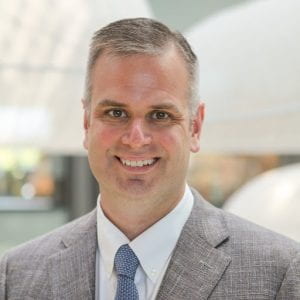Speakers and Abstracts

Development of New First-Row Metal FOX Complexes for Alcohol Dehydrogenation
William D. Jones, Charles F. Houghton Professor of Chemistry, University of Rochester
We have prepared a new route to a series of fused bis-oxazolidene (FOX) bicycles with either chiral rac- or achiral meso- stereochemistries, and attached these to first row transition metals (Mn, Fe, Co, Ni, Cu). The coordination geometries observed vary from NN to NNN to NNO to NNNO coordination. In addition, an iron FOX complex has been found to be active for alcohol dehydration. This talk will describe in detail the dehydration of 1-phenylethanol to give styrene. Off-cycle α-methylbenzyl ethers are also formed reversibly, and their role in the catalysis will be elucidated. Deuterium labelling studies give additional insights into the mechanism of this reaction.
 Away from Equilibrium: Light-Driven Transformations for Organic Synthesis
Away from Equilibrium: Light-Driven Transformations for Organic Synthesis
Robert Knowles, Professor of Chemistry, Princeton University
Inspired by biological photosynthesis and advances in solar fuels chemistry, our lab has become interested in light-driven strategies for organic synthesis wherein excited-state redox events serve to facilitate thermodynamically unfavorable transformations. These electron transfer-based schemes provide a general mechanism for driving reactions in opposition to a thermodynamic gradient by selectively channeling the energy from photon-absorption events. However, they are applicable to a wider range of substrates and reaction types than direct excitation or energy transfer-based photochemical approaches. In this talk, Prof. Knowles will discuss several recent projects, including the intermolecular anti-Markovnikov hydroamination of olefins, aliphatic C-C bond functionalization processes, and contrathermodynamic olefin isomerization reactions.

Photocycloadditions Enabled by Coordination-MLCT Substrate Activation
Valerie A. Schmidt, Professor of Chemistry, University of California, San Diego
Recent developments that achieve selective activation of non-conjugated carbon-carbon double bonds using a coordination-metal to ligand change transfer activation approach will be presented in this talk. This approach has the potential to unlock novel or attain otherwise challenging bond forming processes using simple molecular building blocks. Efforts in methods development for the construction of small heterocycles will be presented alongside combined experimental spectroscopic and computational mechanistic studies.

Multi-Electron Redox Chemistry with Thorium(IV) Iminoquinone Complexes
Suzanne Bart, Professor of Chemistry, Purdue University
Thorium complexes primarily exist in the thermodynamically stable (IV) oxidation state with only a few low-valent thorium(II) and thorium(III) complexes having been isolated. This redox-restricted nature of thorium(IV) makes redox-active ligands an attractive option to facilitate multi-electron redox chemistry with thorium. In this work, a series of thorium(IV) complexes featuring the redox-active iminoquinone ligand and its derivatives, including the iminosemiquinone and amidophenolate species, were synthesized and isolated. Spectroscopic and structural characterization of each derivative established the +4 oxidation state for thorium with redox chemistry occurring on the ligand. Magnetic studies using SQUID magnetometry support the involvement of ligand radicals in the interesting electronic structures that are observed. Preliminary reactivity studies of the amidophenolate complexes with azides, chalcogens, and oxidizing agents are ongoing and will also be discussed.
 Re-Imagining the Periodic Table: Addressing Sustainability Challenges in the 21st Century
Re-Imagining the Periodic Table: Addressing Sustainability Challenges in the 21st Century
Paul Chirik, Edwards S. Sanford Professor of Chemistry and 2020 Linus Pauling Medalist, Princeton University
How chemists interact with and ultimately use the elements on the periodic table is at the core of sustainability. Many are concerned about their “carbon footprint”; there are many more elements on the period table that are under threat to maintain our quality of life. While catalysis is a key ingredient on the pathway to a more sustainable future, the reliance on precious metals raises the elemental footprint of many processes. Earth-abundant transition metals such as iron and cobalt are attractive for catalysis but understanding their fundamental chemistry and electron flow is essential for translation on to applications. My lecture will focus on the unique catalytic chemistry of iron and cobalt with specific emphasis on transformations that are unknown with precious metals. One application of particular interest is the upgrading of hydrocarbons. Methods for the cycloaddition polymerization of butadiene have been discovered that provide a new plastic microstructure that can be returned to pristine monomer upon re-exposure to the iron catalyst. The implications of these catalytic reaction on a new, responsible hydrocarbon future will be presented.
Paul J. Chirik is a synthetic chemist with broad interests in catalysis and sustainability. His research group focuses on chemical reactions with reduced carbon footprint, reliance on earth abundant rather than precious elements and new bond disconnections that reduce waste and separations. A native of Philadelphia, Pennsylvania, he obtained his B. S. in chemistry at Virginia Tech where in the laboratory of Joseph Merola, his interest in the chemistry of the transition metals began. Chirik earned his Ph. D. at Caltech under the supervision of John Bercaw and following a brief postdoctoral appointment at MIT, began his independent career at Cornell in 2001. In 2006, he was promoted to Associate Professor and in 2009 was named the Peter J. W. Debye Professor of Chemistry. In 2011, Chirik and his research group moved to Princeton University where he was named the Edwards S. Sanford Professor of Chemistry. His teaching and research have been recognized with an Arthur C. Cope Scholar Award, the Blavatnik Award for Young Scientists, a Packard Fellowship in science and engineering, a Camille Dreyfus Teacher Scholar Award, an NSF CAREER Award, the 2016 Presidential Green Chemistry Challenge Award, the 2017 ACS Catalysis Lectureship in Catalysis Science, the 2019 Eni Environmental Solutions Prize and the Gabor Samorjai Award for Creative Research in Catalysis. Chirik is the author of more than 225 peer reviewed publications, inventor on more than 20 patent applications and current Editor-in-Chief of Organometallics.
The event schedule is posted on the Award Symposium page.